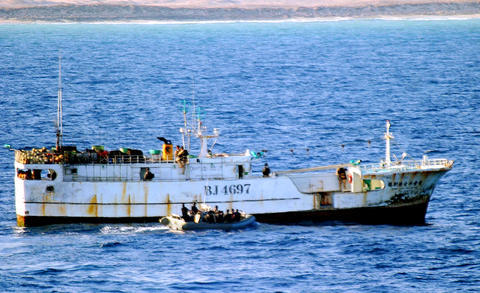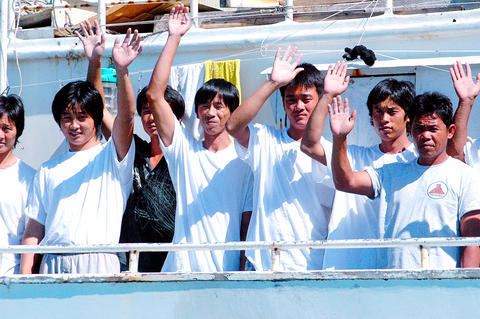With one murdered crewman in the ship's freezer and Somali pirates threatening to execute his son, Captain Lin Sheng-hsin (林勝信) could think of only one thing to do: threaten to throw himself into the shark-infested waters.
Four pirates immediately rushed to keep him from jumping from the fishing vessel.
"It was a test. I wanted to see how much the pirates valued me .... They know if the captain dies, they will get less ransom," the 47-year-old said in an interview this week, safe in Kenya after the US Navy forced the pirates to release the Ching Fong Hwa 168 and its surviving crew, including Lin's 22-year-old son.

PHOTOS: AP
Lin's tale of seven months of detention by pirates on his own ship is frighteningly common off Somali, a part of the world where high seas crime is on the increase. The pirates made off with an unspecified ransom paid by the owner of the ship.
But Lin's story has a twist. After even more ransom was demanded, the US Navy stepped in, forcing the pirates to release the Ching Fong Hwa 168 and its surviving crew.
A Navy spokeswoman said such intervention would continue in response to the spike in piracy in the region.

PHOTO: AP
"The worst time for me was the times they took my son ... they used this boy," Lin said, gesturing at the shaggy-haired Lin Shang-yu (
"They threatened me, said if I didn't call Taiwan they would shoot my son," he said.
Although there has been a spate of pirate attacks off the lawless coast of war-ravaged Somalia -- 26 so far this year, up from eight during the same period last year, the International Maritime Bureau says -- deaths are rare, says Andrew Mwangura, head of the East Africa Seafarers' Assistance Program.
"Most of the time the pirates want money, not to kill people," he said.
Ransoms can reach millions of dollars.
Somalia is deeply impoverished and flooded with weapons. It has long been without a central government with much authority on land, let alone the means to police its long coast. And now, the shaky government is busy battling an Islamic insurgency.
Pirates are often trained fighters linked to the clans that have carved Somalia into armed fiefdoms.
They have heavy weapons and satellite navigation equipment, and have seized merchant ships, aid vessels and even a cruise ship.
Lin's encounter with Somali pirates began one sunny April afternoon, when about 15 of them stormed aboard armed with automatic rifles, machine guns and rocket propelled grenades. Lin's crew was unarmed, and one member was shot in the back. He survived, but when negotiations with the ship's Taiwanese owners were going badly, the pirates executed Chen Tao, 32, from China.
"He was very unlucky because they just took him at random," recalled Lin, who had worked with Tao for two years.
He remembers the young sailor being grabbed out of a lineup, then the six shots that rang out on the other side of the boat.
"We were in shock," muttered the weathered captain, one dragon-tattooed arm reaching up to smooth a sprinkling of white hair.
"Just for money they took a life ... they are not human," he said
"After they shot that guy, I was really afraid," said Lin Shang-yu, reaching out to refill his father's sake glass.
Four crew members were ordered to drag the bloody body into the ship's freezers, where Lin insisted it stay. The pirates wanted to throw it to the sharks.
Over the next few months, the crew battled scurvy when their vegetables ran out, endured frequent mock executions and occasional beatings from guards when the Chinese, Taiwanese and Filipino crew didn't understand orders in Somali and broken English.
The pirates also forced crew members to call home, in hopes the families would pressure the ship's owners to pay the ransom. Lin listened to his wife weep for her son and husband.
Eventually, Lin explained through a translator, the ship's owners paid up last month -- the pirates had demanded US$1.5 million, but Lin refused to say how much was paid.
Everyone thought they were going home, but the pirates held out for more money. That's when the Americans got involved.
The US Navy said its personnel spoke with the pirates by radio, pressing them to leave.
They did so on Nov. 5, by skiffs that took them to shore. Then a US Navy vessel escorted Lin's ship out of Somali waters and provided its crew food and medical assistance.
Lin, who speaks no English, was unclear on who had helped, saying he believed "UN" forces as well as the US military was in the area because of the pirate activity.
US officials won't say exactly what they said to persuade the pirates to leave. But earlier, a US vessel had fired on pirate skiffs tied to a Japanese-owned ship.
At one point in recent months, at least seven ships were being held. Now, following US intervention, only two remain in pirate hands.
US Navy spokeswoman Lydia Robertson said: "Since we were there when the ships were pirated it was an opportunity for us to stay there and help free the ships."
Indonesia remains the world's worst piracy hotspot, with 37 attacks in the first nine months of this year, the International Maritime Bureau said.
Pirate activity is on the rise, with the biggest increases off Africa, and particularly Somalia.
On Wednesday, the crew of the Ching Fong Hwa 168 tucked into lobsters and chicken at the Chinatown restaurant in downtown Mombasa.
Their ship was safely in port, their families had been informed, and the men were enjoying their first taste of freedom -- and sake -- in over half a year.
"To freedom," toasted one man in Bermuda shorts and cheap plastic flip flops.
Another replied, "To home."

Alain Robert, known as the "French Spider-Man," praised Alex Honnold as exceptionally well-prepared after the US climber completed a free solo ascent of Taipei 101 yesterday. Robert said Honnold's ascent of the 508m-tall skyscraper in just more than one-and-a-half hours without using safety ropes or equipment was a remarkable achievement. "This is my life," he said in an interview conducted in French, adding that he liked the feeling of being "on the edge of danger." The 63-year-old Frenchman climbed Taipei 101 using ropes in December 2004, taking about four hours to reach the top. On a one-to-10 scale of difficulty, Robert said Taipei 101

Nipah virus infection is to be officially listed as a category 5 notifiable infectious disease in Taiwan in March, while clinical treatment guidelines are being formulated, the Centers for Disease Control (CDC) said yesterday. With Nipah infections being reported in other countries and considering its relatively high fatality rate, the centers on Jan. 16 announced that it would be listed as a notifiable infectious disease to bolster the nation’s systematic early warning system and increase public awareness, the CDC said. Bangladesh reported four fatal cases last year in separate districts, with three linked to raw date palm sap consumption, CDC Epidemic Intelligence

Taiwanese and US defense groups are collaborating to introduce deployable, semi-autonomous manufacturing systems for drones and components in a boost to the nation’s supply chain resilience. Taiwan’s G-Tech Optroelectronics Corp subsidiary GTOC and the US’ Aerkomm Inc on Friday announced an agreement with fellow US-based Firestorm Lab to adopt the latter’s xCell, a technology featuring 3D printers fitted in 6.1m container units. The systems enable aerial platforms and parts to be produced in high volumes from dispersed nodes capable of rapid redeployment, to minimize the risk of enemy strikes and to meet field requirements, they said. Firestorm chief technology officer Ian Muceus said

MORE FALL: An investigation into one of Xi’s key cronies, part of a broader ‘anti-corruption’ drive, indicates that he might have a deep distrust in the military, an expert said China’s latest military purge underscores systemic risks in its shift from collective leadership to sole rule under Chinese President Xi Jinping (習近平), and could disrupt its chain of command and military capabilities, a national security official said yesterday. If decisionmaking within the Chinese Communist Party has become “irrational” under one-man rule, the Taiwan Strait and the regional situation must be approached with extreme caution, given unforeseen risks, they added. The anonymous official made the remarks as China’s Central Military Commission Vice Chairman Zhang Youxia (張又俠) and Joint Staff Department Chief of Staff Liu Zhenli (劉振立) were reportedly being investigated for suspected “serious